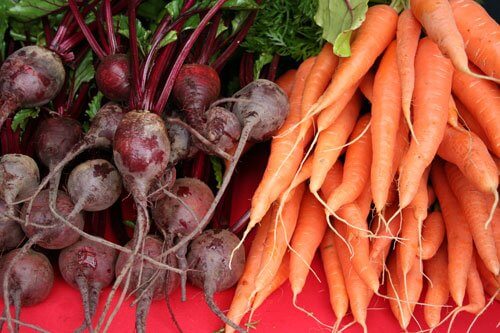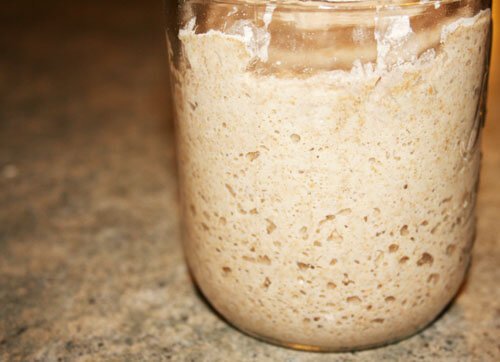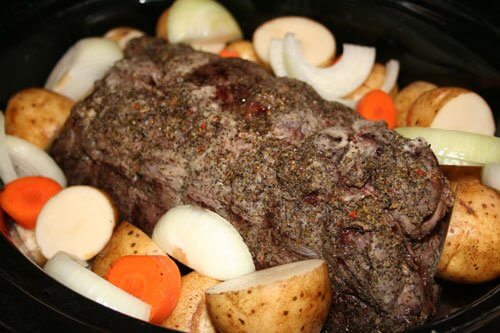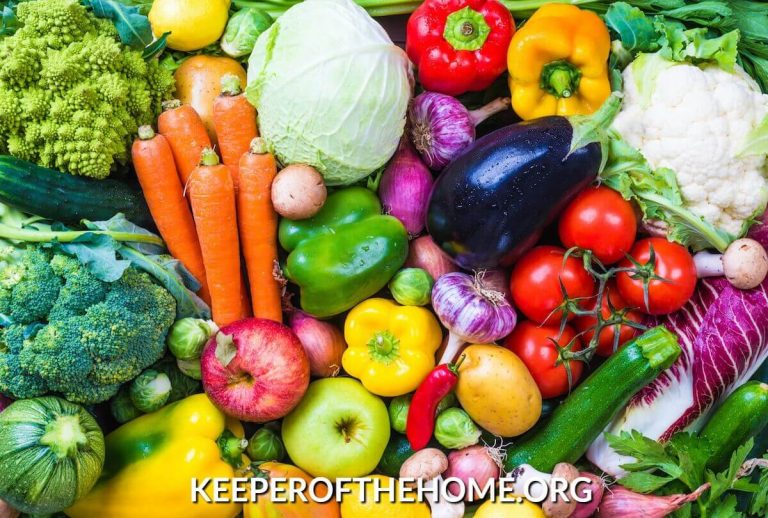What is Traditional Food?
The month of April is Traditional Foods month here at Keeper of the Home. Between myself and the amazing writers who contribute here, we will be delving deeply into a wide variety of traditional foods (raw milk, grains, fermented foods, grass-fed meats, cod liver oil, just to name a few) and we’ll share some of the history, the benefits, and the how’s of preparing these nourishing foods.
To kick things off, I thought it may be useful to approach the broader subject of what exactly “traditional food” means. Here are a few of my own thoughts as we launch into this topic:
In essence, traditional foods are those whole and ancient foods that have been eaten for centuries and even millenia. They are the foods that your great-great-great-great-great grandmother and grandfather would have eaten. They are simple, naturally grown or raised, nutrient-dense, thoughtfully prepared. They are not fads (in fact, they tend to go in direct opposition to most conventional nutritional advice these days).
Traditional Foods Are:
- Foods in their original form, as they were Created— not modernized, not processed, not packaged.
- Foods that have a long history of supporting good health.
- Foods that are whole and nutrient-dense.
- Foods that are simple and basic: meat and poultry, eggs, whole grains, fish, beans and legumes, vegetables, fruit, nuts and seeds, dairy, fats.
Traditional Foods Aren’t:
- A one-size fits all diet (rather it has to do with a healthful variety of foods that are local to you, so if you live on the coast you may eat more fish, but if you live in a fertile valley you may eat plenty of raw dairy and vegetables).
- The so-called “health foods” that you’ll find with bold labels on the store shelves.
- Low-fat, low-cholesterol, vegetarian or vegan.
- Boring, bland, undesirable. (Quite the opposite- I think that once you get accustomed to them, you’ll find that traditional foods taste incredible and are easy to love!)

I love this explanation:
In the simplest explanation, traditional foods focused on four basic principles: 1) avoidance of modern, refined foods; 2) celebration of unrefined, whole and natural foods; 3) respecting the importance of nutrient-density in our food and 4) preparing and eating foods in the same manner that nourished our ancestors and kept them well. In essence, if your great-great-great-great-great-great grandmother wouldn’t recognize it, don’t put it in your mouth.
From Nourished Kitchen
Which Foods are Traditional?
- Pastured, grass-fed and free range meats (cow, goat, lamb as well as wild meats like deer, moose, elk, etc.) and poultry. Also included are organ meats from any of these animals, which were highly prized by traditional cultures.
- Fish that are wild, and preferably from less polluted waters (like Pacific/Alaskan salmon, for example). Cod liver oil is also a historically-valued natural food supplement and an important source of nutrients.
- Eggs from pastured hens.
- Raw (unpasteurized, unhomogenized) dairy products from cows and goats that are grass-fed (not grain-fed). This especially includes cultured dairy products like yogurt, kefir, creme fraiche or sour cream, and cheeses.
- Whole grains that are soaked, sprouted or made using sourdough fermentation methods.
- Organic or ecologically grown vegetables and fruits.
- Bone broths made from the bones of the above-mentioned animals and fish.
- Lacto-fermented vegetable and fruit condiments, such as sauerkraut, chutneys, pickles, various dressings and sauces, etc. Also, fermented beverages, such as kombucha, water kefir, beet kvass and others.
- Fats such as butter, beef tallow and other animal fats, unrefined coconut oil, palm oil, extra virgin olive oil.
- Raw nuts and seeds, that have been soaked for improved digestion.
- Wholesome sweeteners like raw honey, maple syrup, dried fruits, small amounts of unrefined sugars like Sucanat or Rapadura.
- Unrefined sea salt, which is full of minerals. Also, fresh or dried herbs and spices.

Excellent Reading Resources:
The Maker’s Diet– This was the very first book I ever read that broached the topic of traditional foods, and introduced me to Weston A. Price and Nourishing Traditions.
Nourishing Traditions– The most complete book I know of on traditional foods, including health and nutritional information, how-to’s of traditional food preparation, and a ton of delicious, healthy recipes. I use this book constantly.
Nutrition and Physical Degeneration– The original work by Weston A. Price. Though written back in the 1940s, it is still a fascinating read and very eye-opening. I will be writing a post specifically on Price’s work later in the month.
Articles and Posts:
Ancient Dietary Wisdom for Tomorrow’s Children– An excellent overview of Dr. Price’s work and findings.
Principles of Health Diets– From the Weston A. Price Foundation website, this gives a comprehensive list of which foods are traditional foods, and which foods to avoid.
What are Traditional Foods @ Agriculture Society (a wonderful overview)
Traditional Foods in a Nutshell @ Nourished Kitchen (includes some great links to more specific traditional food topics)







I was first introduced to the idea of real food from your blog, discovered after a search for peanut butter smoothies! I’ve made a lot of changes over the past few months. Still working on the family for some of the tougher sells–organ meats, fermented vegetables, and cod liver oil.
I respectfully disagree with one of your points. I believe that a “traditional food” diet can be low-fat, low-cholesterol, vegetarian or vegan. A “traditional food” diet does not necessarily mean that you are eating from every one of the groups you listed. In fact, most ancient societies did not eat such a varied diet as you suggest. Think of the Inuit, whose diet consisted mainly of meats and animal fats, or the natives of South America who ate mostly a plant-based diet of legumes, grains and vegetables. Or even the people of modern-day Greece who eat a predominantly vegetarian diet of fish, dairy and vegetables. You don’t have to eat organ meats or drink kombucha to have a “traditional food” diet. A healthy diet of unprocessed foods does not have to include every item listed above.
In addition, dried sea vegetables are another nutrient-dense “traditional food” item I don’t believe you mentioned.
@E.E., Yes, I missed sea vegetables. They should definitely be included.
I absolutely agree that a traditional diet will not necessarily include such variety. I was trying to cover the bases of all the types of foods that could be considered traditional, not to say that anyone will necessarily include all of those foods in their particular diet. One of my points was that it isn’t a “one-size fits all” diet, and I think that’s what you’re addressing. Depending on where people live and what they have access to, they definitely won’t eat every food listed, and in fact they may eat only a much smaller selection, like the example that you gave of the Inuit. You’re very right that one doesn’t need to eat organ meats or drink kombucha to have a traditional diet. 🙂
As for vegetarian and vegan, while there are definitely some people groups who lean much more towards this end and eat significantly less animal foods, in Dr. Price’s studies he actually searched in particular to find primitive groups that were experiencing robust health on a diet free of animal foods. He didn’t really find it. The groups that were primarily vegetarian were noticeably less hardy than those that ate more animal foods. As well, even the groups that were nearly vegetarian did go to great lengths to include certain items in their diet, such as dried fish eggs for the Peruvian indians.
Perhaps I should have clarified my use of the word “vegetarian”. I believe that one can eat a healthy, traditional vegetarian diet IF they are a lacto/ovo/pesco vegetarian (a vegetarian who includes raw dairy, or eggs, or fish and seafood in their diet). I was referring more to those who subsist on plant foods only and have a very low fat intake.
To me, traditional foods doesn’t include “pastured” animals. Don’t get me wrong grass fed is very important. The idea that animals are factory reared was completely alien to me until I started reading whole food blogs. I still cannot get my head around animals being reared in a factory. We are very lucky that we don’t have that here, every animal is pastured (apart from the poor old chickens). I live in the middle of a large town & I can see cows in a field from my bedroom window.
I think “pastured” in the U.S means a little more because it is the farmer making a conscientious choice to farm his animals in a better way. Pastured here is standard so maybe the farmer does not take his animal’s welfare into consideration as much. So traditional foods to me, means going that extra mile & finding organic or organically raised meat & poultry.
Looking forward to your series Stephanie.
@Nicola, Are you in the UK, Nicola? Unfortunately, although pastured used to simply be the way that all animals were raised, it just isn’t anymore in North America and it’s one of the things that we really have to consider as we seek out our meat and poultry sources. I think it’s wonderful to know that it is still more standard in some parts of the world. I would definitely agree that part of traditional foods includes a purposeful seeking out of high quality foods.
@Stephanie @ Keeper of the Home,
I’m in Ireland Stephanie. I know people in the U.K are currently trying to fight against the possible opening of their first factory farm (sorry don’t quite know what to call them). A farm in the south has applied to the government for planning permission for one. There have been thousands of objections so I hope they are taken into consideration. A grant of planning permission could mean alot of these factories opening in the U.K and Ireland.
@Nicola, I hope that all of the objections have the power to stop this one from going ahead!
I agree that traditional foods are very important and think that there is lots of wisdom from past generations about food and it’s preparation that should be remembered. It seems the “new” ways aren’t always better since most food (if you can even call some of it that) at grocery stores doesn’t come close to being nutritious. I am looking forward to your series and hope that you will elaborate particularly on the sourdough starter. This is something I would love to try, but for some reason the link above wouldn’t work for me.
Hi Stephanie,
I’ve been reading your blog for several months now and wanted to thank you for all the great info. I started my real food journey about a year ago and when I think back to the way I used to shop, cook and eat it was pretty scary. I still have a lot to learn but am proud of my progress and thankful to have awesome resources like KOH.
@Chris@ Get Real Chris, I can relate to the scariness of how I used to eat as well. 🙂 So glad that you’ve been finding helpful info and making good progress, that’s wonderful!
@E.E., My thoughts exactly. Vegetarians can have a very nourishing diet.. pastured eggs, raw pastured milk and cheese, grass fed butter, fermented veggies, sprouted grains, sea veggies, kefir, yogurt, ect. LOTS of ways to eat traditional on a veg diet.
You articulated my thoughts beautifully regarding how our family has chosen to nourish our bodies (really, our temple).
I am constantly asked by friends and family to define my philosophy on why we eat or not eat certain things. I think I need to sit down and write key points (scripture asks us to always be ready). Your blog post will be a valuable tool in doing just that! Like you, the books you mentioned above have been so thought and life changing.
Thank you!
Under His Wings,
Malinda
“So, back to my question at the end of the video…”
I can’t seem to find a video… am I missing it somewhere? Or is it in a different post?? 🙂
@Tammy L, I don’t know what keeps happening to it. I embed it, it shows up, then it mysteriously disappears. YouTube boggles my brain. 🙂
It’s there again now, hopefully you can see it!
I love your website, and agree with a lot on the site. However, this is one area where I feel a bit differently. I do agree that we should be eating food in it’s most natural form like our ancestors did. However, I don’t believe our diet should consist of what our ancestors ate. I believe they were able to eat more fats, etc. because of the lifestyle they led. They were constantly working physically, whether farming, doing the laundry, churning the butter, etc. Our generation is definitely not that active. Even if we make a point to exercise, most of us still don’t get the same amount of exercise our ancestors did just because we don’t have to with advanced technology.
Although I am not a vegan, I don’t eat a lot of meat and eat a lot of raw food diet meals and vegan meals. I tried things such as dairy kefir, etc. and incorporating more eggs and things like that into my diet, but in the end I just felt sick.
I do agree that there is not one diet that fits all. However, even after reading and trying many recipes from Nourishing Traditions, etc. I’ve concluded that way of eating for the most part is not for me. But I encourage anyone who feels better on that diet to stick to it!
@Amanda, Thanks for your honesty, Amanda. I’m happy to have different ideas represented on the site! 🙂
I completely agree that we are not active in the same way that our ancestors were, not even close for most of us. For me, though, it’s not the fat that seems to bother me. It’s when I have excess carbs and particularly sweeteners (natural or not). Those are the things that make me feel less well, less energetic, and that cause me to struggle with my weight a little bit. That addition of extra fat into my diet was actually one of the things that helped me to feel better and stabilize my weight when I began to eat this way.
Fact is, there is a wide variety of traditional diets out there. Some ate far less meat than others, some didn’t consume dairy, some focused heavily on produce and fish, etc. I think that you can still eat a traditional diet in the sense of eating whole, unprocessed foods that are highly nourishing, without necessarily eating meat or animal products heavily. Maybe you do better with fish, or other fats like coconut oil, and lots of raw and fermented vegetables. I think we definitely have to listen to our bodies and eat in a way that allows us to feel our individual best.
I know this post if from a few days ago (I’m playing catch up) I love your blog btw.
I agree wholeheartedly about eating a traditional diet. the idea was first introduced to me two years ago in Michael Pollens book “In defece of food” He also references Dr. Price’s findings. One thing though that grabed me (because traditional diet can mean so many different things to different people, and one diet not fitting everyone like you said) was that pehaps looking at your family origins to determine your traditional diet might be helpful.
As you addressed in one of the comments, one person might do better with less meat, while another might need to avoid dairy, carbs etc…
When I look at my heritage (half mexican, half scandinavian decent) I have tried to take into account what those cultures might consider traditional. And incorporated many of those things in our diet.
I just think that since America is such a young country and quite a melting pot, ethnicity is worth considering.
Thanks again for this post and this months topic, it is so timely and I am reinspired, as I will admit I was getting tired and wondering if the effort to raise our own meat sources, eggs, and the search for raw fresh dairy, and gardening really does make a difference. Thanks for the reminder and encouragement to press on.
Michael Pollens book ” In Defense of food” sorry crazy typing
Hi Stephanie,
I just discovered your blog through Passionate Homemaking this week…and through you a whole new world of traditional foods, primitive foods, raw foods, LF, etc!
I’m a little overwhelmed by it all, to be honest (and more than a little begrudging of my parents for feeding me such garbage my whole life!) I’m frustrated too, though, because my husband and I are career international missionaries in Asia. Most of these sites seem to be dependent on items you can find in the States that would be difficult/impossible for me to find in my current country. Do you know anyone who blogs about “real food” while living in Asia? Or do you have any suggestions for us? I’d really appreciate it!
@Ashley, Welcome! I don’t know of any bloggers living in Asia, but we did live in Japan for a year. The best thing that I learned was to ask, ask, ask the nationals to help me find the resources I was looking for. Not store employees, but regular men and women that we met. Through asking, I found a delivery service with lots of organic product, another one with lots of organic pantry items and alternative grains, etc. If we had stayed longer, I probably could have found farmers to buy from directly.
Well, I’m obviously late in responding, but I thought I’d say anyway…
@Ashley,
My husband and I discovered traditional foods in South Korea. What a challenge! I don’t know your situation, but it seemed, to me, that most of the food that was imported for foreigners was heavily processed. It had to be, to make the leap over the ocean. A lot of canned fruits and vegetables, soups and sauces. It was really hard and, just like it is now that we’re back in the states, it was absolutely imperfect. I would say that it’s easier in America, but in all honesty, it’s never going to be as easy as it is to open a can of soup.
I don’t know if I can help at all, but send me an email if you’d like! 🙂
Stephanie, I don’t know if traditional cultures had the market cornered on good health. I think, primarily, they were just completely without methods of processing, and at the mercy of the land they lived on. But then there’s the fertility diets that so many cultures fed their young men and women, which I just think is incredible. The wisdom and knowledge that comes from tradition is so much deeper than I think we realize a lot of the time. Traditional foods also points me back to God on a regular basis. Just learning how my body works and how certain foods enhance and energize me. It’s amazing! I frequently find myself all awesomed out by the power God has given to us in choosing how and what we eat. It’s truly a responsibility and one that I take seriously.
Thanks for your blog and all the information you give your readers!
Catie
Wow, great! I’ll be moving to small town Japan in July for 2 years, so it’s encouraging to know that there is some options available. Would you say the price difference between organic food and regular produce in Japan is higher than the difference between organics and regular food in USA? If you remember any of the services you used, that’d be really helpful, too!
@Ashley, The price difference is a bit bigger, but similar on some things. It’s not crazy, you just might have to be more choosy about what you buy organic. I only remember the name of one: Tengu. That’s where I bought a lot of pantry staples, especially my grains.
Here’s the website:
http://www.naturalhealingcenter.com/creative/tengu.htm
I’ve will so tradtional food, is amazing wow that he for give to the familiar and day light nothing in men great problem vitamins and proteins good to healthy accuse enhancer to body.
How do I learn more about traditional foods ?
I would suggest checking out the Weston Price Foundation website, or reading the book Nourishing Traditions.
Avoid fast food and use tradesnal food